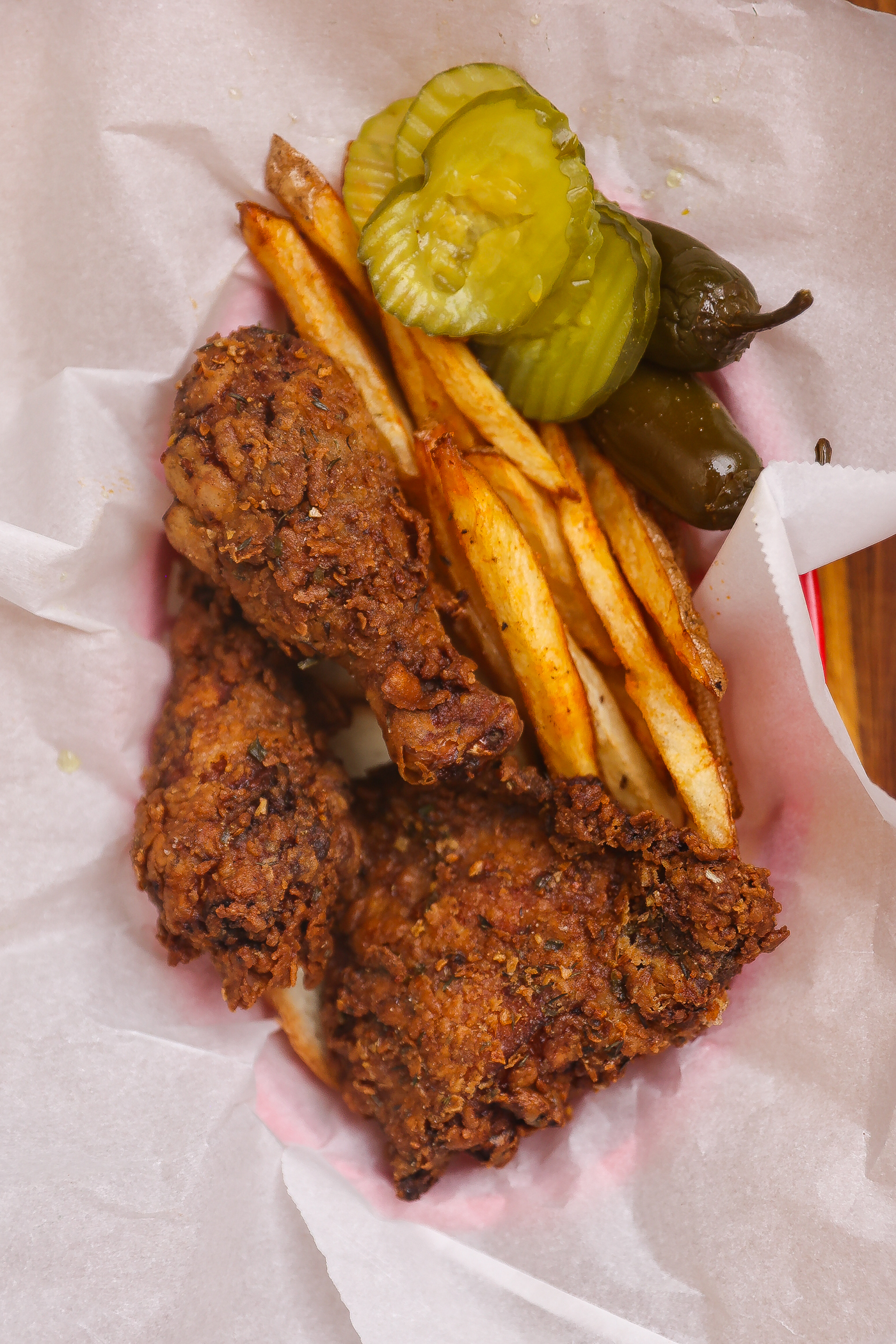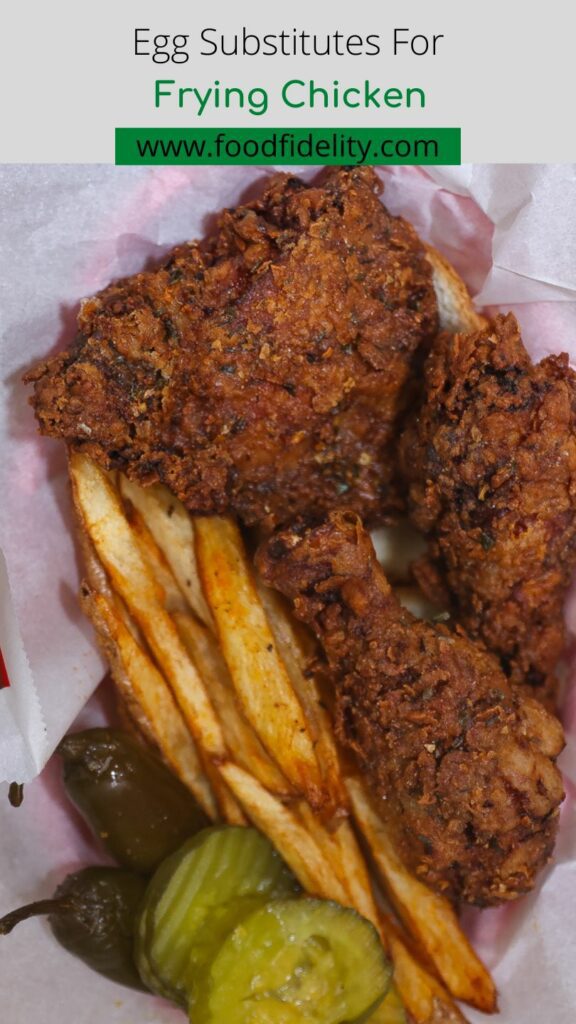Out of eggs but craving that perfectly crispy fried chicken? Don’t worry—there’s more than one way to achieve that golden crunch without cracking a single egg!
Fried chicken is a classic dish known for its crispy, golden coating and tender meat. Many traditional recipes call for eggs as a binder to help the flour or breadcrumbs stick to the chicken, creating that delicious crunchy crust.
But what if you’re out of eggs, or you’re following a vegan, egg-free, or allergy-friendly diet? Fortunately, there are several excellent substitutes that can help you achieve the same crispy results without eggs. In this post, we’ll explore some of the best egg substitutes for frying chicken and how to use them.
Why Are Eggs Used To Fry Chicken
Eggs are used in frying chicken for several important reasons:
- Binding agent: Eggs help the flour, breadcrumbs, or other coatings stick to the chicken, ensuring an even, crispy layer.
- Crispiness: When eggs cook, they firm up and help create a golden, crunchy exterior.
- Moisture retention: Eggs add moisture, which keeps the chicken tender and juicy on the inside while frying.
- Flavor enhancer: The richness of eggs adds a subtle flavor that complements the seasonings and coating on the chicken.

Understanding Egg Substitutes in Fried Chicken Recipes
Egg substitutes play a crucial role in fried chicken recipes, especially for those with egg allergies or preferences for vegan or vegetarian options. Eggs serve as a binder, helping the coating adhere to the chicken, and also provide moisture and richness to the dish. When substituting eggs in fried chicken recipes, it’s essential to choose an ingredient that can replicate these functions.
Some popular egg substitutes for fried chicken include:
- Chia Seeds: When mixed with water, chia seeds form a gel-like substance that can help bind the coating to the chicken. They are a great option for those looking for a natural, plant-based egg substitute.
- Ground Flaxseed Meal: Similar to chia seeds, ground flaxseed meal can be mixed with water to create a gel-like texture, making it an excellent binder for fried chicken.
- Vegan Egg Substitutes: Commercial products like JUST Egg or Ener-G Egg Replacer are designed to mimic the properties of eggs and can be used as a direct substitute in your fried chicken recipe.
When using egg substitutes, it’s crucial to adjust the amount of liquid in the recipe accordingly. Some egg substitutes, like silken tofu, can add extra moisture, while others, like chia seeds, may absorb more liquid than eggs. Experimenting with these substitutes will help you find the perfect balance for your fried chicken.
1. Buttermilk
Buttermilk is one of the most popular egg substitutes for those looking to fry chicken. It not only helps the coating stick but also tenderizes the chicken, giving it a juicy, flavorful bite. Simply soak your chicken in buttermilk for a few hours before dredging it in your flour or breadcrumb mixture. The tanginess of the buttermilk adds an extra depth of flavor, and it creates a beautifully crispy crust when fried.
How to use it: Submerge the chicken in buttermilk for at least 30 minutes, then proceed with your regular breading and frying process.
2. Milk and Flour Mixture
A simple milk and flour mixture can also work wonders as an egg substitute. The flour thickens the milk, helping it bind to the chicken and hold onto the coating. Adding a pinch of baking powder to the milk and flour mixture can help create a lighter, fluffier coating. You can use any type of milk, including dairy-free options like almond or soy milk.
How to use it: Mix equal parts of milk and flour to form a batter, dip the chicken in, then coat it with seasoned flour or breadcrumbs before frying.
3. Yogurt
Plain yogurt, whether regular or Greek, is another great alternative to eggs. Its thick, creamy texture helps the coating stick to the chicken while adding a tangy flavor. For extra flavor, consider adding garlic powder to the flour or breadcrumb mixture. Yogurt also acts as a tenderizer, making your fried chicken juicy and flavorful.
How to use it: Coat the chicken in a thin layer of yogurt before dipping it in the flour or breadcrumbs for frying. You can thin the yogurt slightly with water if it’s too thick.
4. Vegan Mayo
For a plant-based option, vegan mayo works well as a versatile vegan egg substitute for frying chicken. Its creamy consistency allows the breading to stick while adding a rich flavor.
How to use it: Spread a thin layer of vegan mayo over the chicken, then dredge in flour or breadcrumbs before frying. It’s perfect for creating a crispy crust without the need for eggs.
5. Aquafaba
Aquafaba, the liquid from a can of chickpeas, is an excellent egg replacement that mimics the binding properties of eggs. Aquafaba can be whipped to create a texture similar to that of whipped egg whites, making it an effective replacement. It’s a great choice for those following a vegan or egg-free diet and works surprisingly well in fried dishes. Aquafaba is light and easy to work with, helping the coating stick while producing a crispy finish.
How to use it: Whisk the aquafaba until it’s frothy, dip your chicken pieces into it, then coat with flour or breadcrumbs and fry as usual.
Which Substitutes Result In Crispiest Chicken
The egg substitutes that result in the crispiest coating for fried chicken are:
- Buttermilk: Its acidity helps tenderize the chicken and create a crisp, well-adhered coating when fried.
- Cornstarch and Water Slurry: Cornstarch is known for creating a light, crispy texture, making this mixture a great alternative to eggs.
- Aquafaba (Chickpea Liquid): When whisked, aquafaba creates a frothy texture that binds well to the coating and produces a crispy crust.
- Milk and Flour Mixture: The added flour thickens the milk and helps create a crunchy, crispy layer.
Which Adds Best Taste
The egg substitutes that add the most flavor to fried chicken are:
- Buttermilk: Its tangy, rich flavor enhances the taste of the chicken while tenderizing the meat. Kefir milk which is similar is also effective.
- Yogurt: Adds a creamy, slightly tangy flavor that complements the spices in the coating.
Binding and Moisture Properties
Egg substitutes can significantly affect the binding and moisture properties of fried chicken. Some, like silken tofu or chia seeds, can add extra moisture to the dish, while others, like ground flaxseed meal, can absorb more liquid than eggs. Achieving the right balance is key to ensuring your fried chicken turns out crispy and delicious.
Here are some tips to help you get it right:
- Use a Combination of Egg Substitutes: Mixing different egg substitutes can help achieve the right balance of binding and moisture. For example, combining silken tofu with ground flaxseed meal can provide both moisture and binding properties.
- Adjust the Amount of Liquid: Depending on the egg substitute used, you may need to add more or less liquid to the recipe. For instance, if using chia seeds, you might need to add a bit more liquid to compensate for their absorbent nature.
- Don’t Overmix: Overmixing can lead to a dense or tough coating. Mix the ingredients just until they come together to maintain a light and crispy texture.
By understanding how different egg substitutes affect binding and moisture, you can better tailor your fried chicken recipe to achieve the perfect crispy coating.
Tips for Using Egg Substitutes in Fried Chicken Recipes
Using egg substitutes in fried chicken recipes can be a bit tricky, but with some practice and experimentation, you can achieve delicious and crispy results. Here are some tips to keep in mind:
- Choose the Right Egg Substitute: Different egg substitutes work better in different recipes. Experiment with options like silken tofu, chia seeds, ground flaxseed meal, and commercial vegan egg substitutes to find the one that works best for you.
- Adjust the Amount of Liquid: Depending on the egg substitute used, you may need to adjust the amount of liquid in the recipe. For example, if using ground flaxseed meal, you might need to add a bit more water to achieve the right consistency.
- Don’t Overmix: Overmixing can lead to a dense or tough coating. Mix the ingredients just until they come together to maintain a light and crispy texture.
- Use a Thermometer: Frying at the right temperature is crucial for achieving crispy and golden-brown results. Use a thermometer to ensure the oil reaches the correct temperature, typically around 350°F (175°C).
- Don’t Overcrowd the Pot: Frying too much chicken at once can lower the oil temperature, leading to greasy or undercooked results. Fry in batches if necessary to maintain the oil temperature and ensure even cooking.
By following these tips and experimenting with different egg substitutes, you can create delicious and crispy fried chicken recipes that cater to various dietary needs and preferences. Happy frying!
Conclusion
Whether you’re avoiding eggs due to dietary restrictions or just don’t have any on hand, these egg substitutes for frying chicken can help you achieve the crispy, delicious results you’re looking for. From buttermilk to aquafaba, there’s an option for everyone. Experiment with these alternatives and find the one that works best for you—your fried chicken will still turn out golden, crunchy, and full of flavor!
For a unique twist, a glaze made with maple syrup can be used to enhance the flavor of the fried chicken.
Happy frying!

